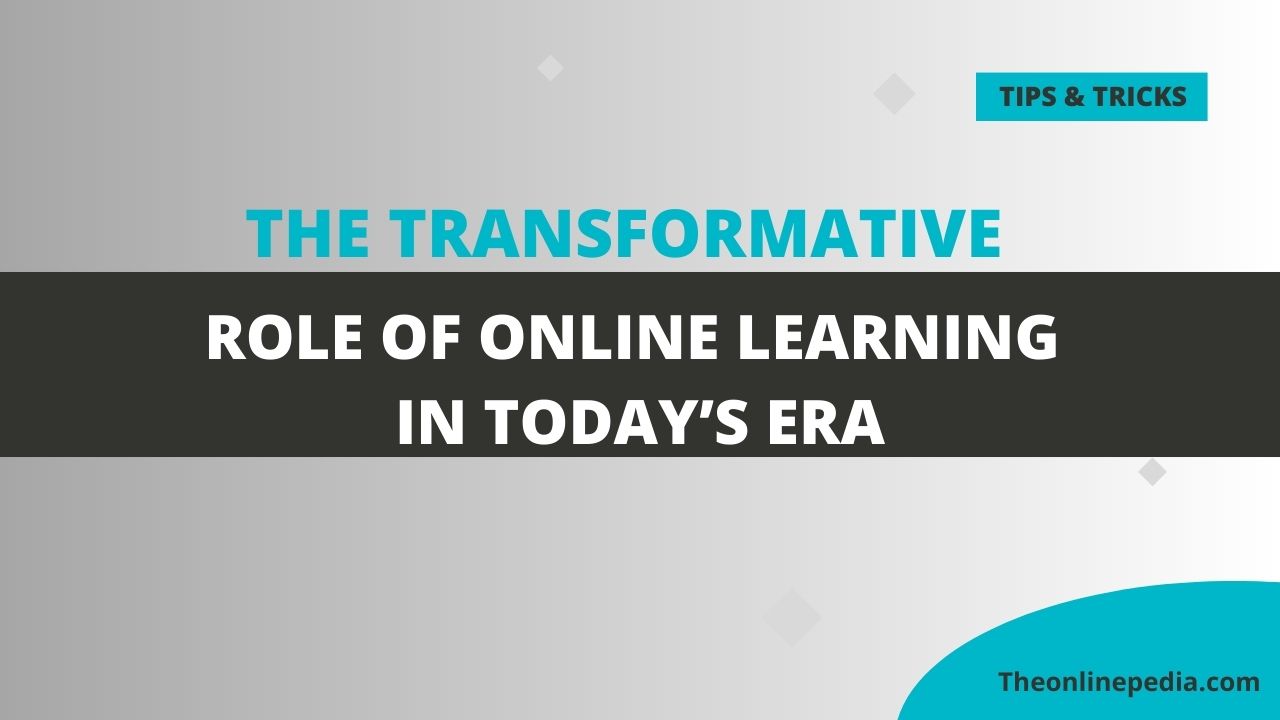The Transformative Role of Online Learning in Today’s Era, Online learning has become a revolutionary force in the fast-paced, constantly-evolving digital world, revolutionizing education in the modern day. The traditional brick-and-mortar classroom is no longer the only way to acquire knowledge and skills as technological developments continue to change our environment. With its ability to provide a flexible, accessible, and individualized approach to education, online learning has emerged as a leading option. In this essay, we will examine the function of online education in the modern world, outlining its advantages, drawbacks, and effects on students and society at large.
Resources for Online Learning
In general, when taking an online degree program, you might encounter resources like:
- EBooks;
- Journals;
- Videos;
- Recorded lectures;
- Quizzes;
- Discussion forums
- Live Q&A sessions; and
- Interviews.
The institution where you enroll in your online program will determine the resources available to you for online study. Although some online learning programs may ask you to mail in orders for physical textbooks, this practice is often being phased out in favor of eBooks and online-only delivery options.
By enrolling in an online learning program, you will be formally enrolled at your school and have access to all of the same resources as on-campus students, including your school’s online library, learning management system (like Blackboard), membership in the student union, and more! While earning a degree online is identical to earning one on campus, you have more control over your study schedule. Online education also makes it possible for people with a variety of schedules and obligations, like working professionals or stay-at-home parents, to access education without jeopardizing their other commitments.
The Transformative Role of Online Learning in Today’s Era
Flexibility and Accessibility
Flexibility and access are first-rate. The flexibility of online learning is one of its biggest benefits. Online courses give students the freedom to learn at their own pace and convenience, unlike traditional classroom settings.
As long as they have an internet connection, students can access educational resources and take part in virtual classrooms at any time, from anywhere. Geographical obstacles are removed by this accessibility, allowing people to pursue their education wherever they may be.
Also Read:
What is Freelancing? How To Become a Freelancer?
How To Teach A Child English At Home Step By Step Guide?
The Ultimate Guide to a Free Online Encyclopedia for Elementary Students
Individualized Learning Environment
Adaptive learning technologies, which use data analytics and algorithms to customize educational content to individual learners, are frequently used by online learning platforms. This individualized method makes sure that students get education and materials that are tailored to their individual needs, learning preferences, and speed.
Online courses encourage a more effective and interesting learning experience by catering to the strengths and weaknesses of each learner. Additionally, online learning environments frequently provide a variety of multimedia resources, interactive tests, and forums, increasing the learning experience and accommodating various learning preferences.
Lifelong Learning and Skill Development
Continuous learning and skill improvement are essential for professional advancement in the quickly evolving job environment of today. To be competitive in their jobs, people need to constantly upskill or reskill, and online learning has become an essential tool for doing so.
With such a wide selection of online courses and certifications available, students can learn new skills, investigate various fields of study, and adjust to changing business trends. Furthermore, micro-credentials or badges, which offer concrete evidence of gained abilities and improve employability prospects, are frequently offered by online learning systems.
International Collaboration and Networking
The Transformative Role of Online Learning in Today’s Era, Global networking and cooperation opportunities are fostered via online learning platforms. Students from many countries and backgrounds can interact digitally and share ideas, viewpoints, and experiences. There is no physical limit to the participatory learning environment that is created through discussion boards, group projects, and online classrooms. Through online collaboration, students can extend their perspectives and improve their learning experience while also developing cross-cultural communication skills and exposure to a global network of experts.
Overcoming Obstacles and Restrictions
Online education has many benefits, but it also has some drawbacks and restrictions. For some people, technical problems with their technology or troubles with internet connectivity can make studying more difficult. Online learners must also be highly motivated and self-disciplined because they are responsible for managing their time and remaining active in a virtual setting.
Online courses could also lack the in-person interaction present in traditional classrooms, which can have an influence on some areas of learning, like fostering interpersonal relationships or participating in hands-on activities.
Conclusion
The Transformative Role of Online Learning in Today’s Era, Online learning has revolutionized education in the modern era by enabling flexibility, accessibility, and individualized learning experiences. It has increased access to education for people all around the world, enabling lifelong learning and skill development. Through online platforms, students can collaborate with classmates anywhere, promoting diversity and a sense of community. Technology developments continue to close gaps and improve the entire learning experience, despite the difficulties of online learning. In order to build a more inclusive and equitable educational system for everyone moving forward, it is essential to recognize the potential of online learning and take advantage of it.
Written By Abeera Arshad

